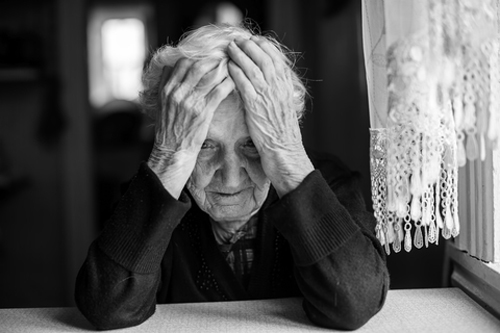Depression and Aging – What Everyone Should Know About Getting Older
 Depression and aging do not have to go hand-in-hand. Later-life depression is often the result of other factors that can be prevented and avoided.
Depression and aging do not have to go hand-in-hand. Later-life depression is often the result of other factors that can be prevented and avoided.The idea that depression is a natural part of the aging process is one of the biggest myths exposed by modern research. One study published in Industrial Psychiatry Journal in 2009 followed 55 elderly men and women to explore the connection between aging, depression and loneliness. They found that depression starting late in life is more often connected to medical or health conditions than to the aging process.
The preceding study of depression and aging also showed that loneliness due to the loss of loved ones and the lack of social networks can lead to depression. Since older people are more likely to experience those losses and reduced connections, they’re at greater risk of suffering from symptoms of loneliness, which can in turn lead to depression.
Depression was found to be the result of social isolation rather than old age, which agrees with many other studies concluding that depression isn’t a required part of the aging process.
Risk Factors for Elderly Depression
Another study of depression and aging printed in the 2010 Annual Review of Clinical Psychology found that depression is more prevalent in young adults than older adults. The researchers noted that when members of the elderly population are depressed, it’s often due to one or more of the following life factors:
- Genetic vulnerability
- Neurobiological changes
- Stressful events
- Insomnia
- Limiting or stopping daily activities
- Self-critical thinking
- Widowhood
The researchers noted that older people can lower their risk of depression by remaining involved in daily routines and maintaining social and religious ties.
Can Depression Speed Up Aging?
Research completed by the University of Sussex and printed in journal Psychological Medicine in 2018 shows a clear correlation between accelerated aging of the brain and depression. The study followed more than 70,000 people who exhibited signs of depression or were diagnosed with clinical depression. They looked for the rate of mental decline in the following areas:
- Memory
- Executive functioning (including decision making)
- Information processing speed
The results showed that people who reported depression earlier in life experienced greater mental decline in their later years. This supports research completed years earlier that found a connection between depression and dementia.

Signs of Depression in the Elderly
When it comes to depression and aging, it’s sometimes difficult to identify depression in an older person who is forced to withdraw from many daily routines and social interactions due to medical issues. One of the most noticeable symptoms of depression is withdraw from activities and social connections, but many loved ones assume that an older person isn’t interacting or moving around as much due to basic old age and/or medical problems. This means that we have to look for other signs if we’re going to catch depression before it leads to additional health problems.
According to the Centers for Disease Control and Prevention, these are the most common signs of depression in older people:
- Pessimistic thinking/talking
- Irritability
- Difficulty with or disinterest in decision making
- Fatigue
- Feelings of hopelessness
- Restlessness
- Memory loss
- Lack of concentration or focus
- Insomnia or excessive sleeping
- Change in eating habits
- Body pain, headaches, cramps, etc.
Notice that there are many other potential causes for most of these symptoms. Depression can exacerbate some of these symptoms if they’re initially caused by another medical issue.
You may also notice that someone you care about exhibits some of these symptoms with no other possible cause. That’s when you know that it’s time to take action before the depression leads to cognitive decline and other health problems.
Suicide, Depression and Aging
Suicide rates among people over the age of 65 increased slightly between 2014 and 2018. In 2016, people between the ages of 45 and 54 had the highest suicide rate with people over the age of 85 coming in second. Since we also know that there is a strong connection between suicide and depression, it’s clear that acting quickly to help people who show signs of depression could help lower the suicide rates for people over the age of 45.
If you suspect that someone you care about is even mildly depressed, start by having an honest discussion with them about their quality of life and feelings. Trying to get them more connected to a social or religious circle can help, as can exercise and an increase in daily activity level if possible.
As we all progress through the aging process, we can do ourselves a favor by maintaining friendships and other social connections. Staying active, exercising, and continuing daily routines and habits for as long as possible is also important. Continuing to learn new things, setting goals and striving for new accomplishments can help us all remain mentally sharp, happy and positive for the rest of our lives.
The good news is that the connection between depression and aging can be broken.
More Topics That May Interest You
Some of the advertisers on my website are affiliate partners, which means that I may receive a small commission from any sale, at no extra cost to you.
For example, the Amazon affiliate advertising program is designed to provide a means for sites to earn fees by advertising and linking to amazon.com.
Your tips and purchases help to support this free-information website.
Thank you.
The content of this website is for informational purposes only and not intended to be taken as a replacement for professional medical advice, care, diagnosis or treatment by a doctor, dietitian, physical therapist, nutritionist or fitness instructor.
DO NOT BEGIN ANY EXERCISE PROGRAM WITHOUT CHECKING WITH YOUR DOCTOR FOR UNDERLYING CONDITIONS THAT MAY PREVENT YOU FROM DOING SO.










